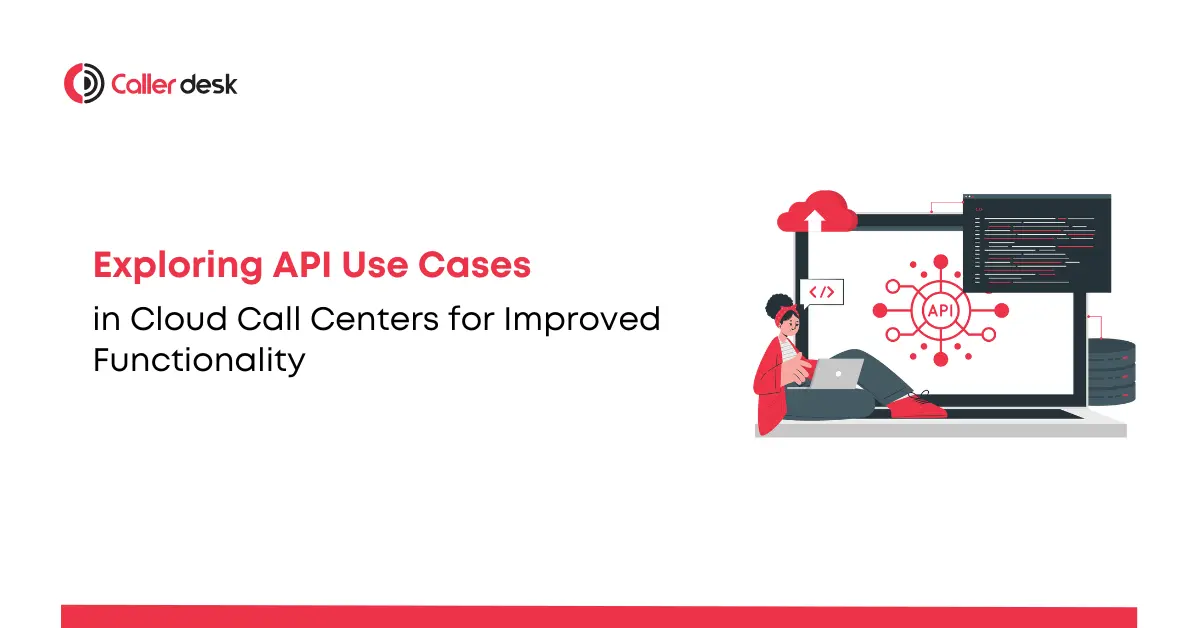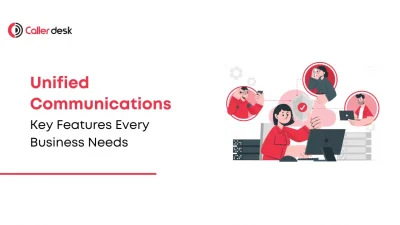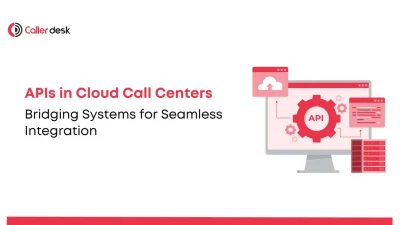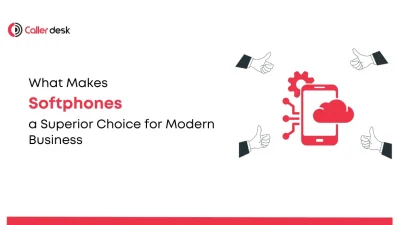Effective communication lies at the heart of successful customer interactions. Cloud call centers have emerged as the preferred solution for managing multi-channel communication across voice, email, chat, and social media. However, as businesses scale and customer expectations rise, seamlessly integrating various tools and platforms becomes a challenge.
This is where APIs (Application Programming Interfaces) step in, serving as digital bridges that connect diverse systems. APIs empower cloud call centers to streamline workflows, automate repetitive tasks, and deliver personalized, efficient service. By integrating APIs into their operations, businesses can elevate customer satisfaction, boost agent productivity, and drive growth.
What is an API?
At its core, an API (Application Programming Interface) is a set of rules that allows two software systems to communicate and exchange data. APIs enable seamless integration between different tools, ensuring that call center operations run smoothly.
How APIs Work in Cloud Call Centers
- APIs act like translators, ensuring systems with different frameworks and technologies can exchange information without conflict.
- For example, when a customer calls a cloud call center, an API can pull their details from a CRM (Customer Relationship Management) system and display them instantly for the agent.
This seamless data flow eliminates manual processes, reduces errors, and enhances the overall customer experience.
API Use Cases in Cloud Call Centers
1. CRM and Contact Center Integration
Integrating CRMs with call center software is one of the most transformative applications of APIs.
- Enhanced Data Access: APIs fetch customer history, preferences, and account details in real-time.
- Impact: Agents can resolve issues faster and with greater personalization, increasing customer satisfaction.
Example: A telecom company uses an API to sync customer call records with its CRM. When customers call with service issues, agents can instantly access their history, streamlining resolution.
2. Automated Ticketing and Workflow Management
Manual ticket creation is prone to errors and inefficiencies. APIs automate this process, ensuring accuracy and speed.
- How It Works: APIs create tickets based on specific triggers, such as unresolved calls or follow-up requests.
- Benefits:
- Reduces agent workload.
- Ensures that no customer query goes unnoticed.
Real-Life Scenario: An e-commerce company uses an API to generate tickets when a customer reports a delayed shipment. The API assigns the ticket to the logistics team and notifies the customer of the progress.
3. Advanced IVR Functionality
Interactive Voice Response (IVR) systems play a crucial role in call centers, and APIs take their capabilities to the next level.
- API Enhancements:
- Fetch real-time data like account balances or service status.
- Enable advanced self-service options.
- Result: Reduced wait times and higher first-call resolution rates.
Example: A banking call center uses APIs to allow customers to check account balances or transaction details through the IVR system without speaking to an agent.
4. Omnichannel Communication for a Unified Experience
Today’s customers interact with businesses across multiple channels. APIs unify these interactions for a consistent experience.
- Key Features:
- Synchronize data across chat, email, and social media.
- Enable agents to view the entire conversation history, regardless of the channel used.
- Customer Benefits: Customers don’t need to repeat their queries, creating a smoother journey.
Example: A retail business uses APIs to integrate its email and social media platforms with its call center. Agents can respond to customer queries on Instagram and continue the conversation over email seamlessly.
5. Real-Time Analytics and Reporting
Data is vital for decision-making, and APIs enable real-time integration with analytics platforms.
- Capabilities:
- Track performance metrics such as call duration, resolution rates, and customer satisfaction scores.
- Identify trends and bottlenecks to improve service quality.
- Outcome: Proactive decision-making and better resource allocation.
Example: A call center monitors agent efficiency using API-connected dashboards. If call handling times increase, managers can address the issue immediately.
6. AI-Powered Chatbot and Voice Assistant Integration
APIs enable seamless integration of AI tools, such as chatbots and voice assistants, into cloud call centers.
- Advantages:
- Handle routine inquiries, such as FAQs or order status checks.
- Free up agents for complex queries.
- Customer Impact: Faster responses and 24/7 availability.
Scenario: A healthcare provider integrates a chatbot through APIs to schedule appointments and answer common medical queries, reducing call volumes by 40%.
7. Payment Gateway Integration
Payment processing over the phone is simplified with APIs.
- What It Does:
- Connects the call center system directly to payment gateways.
- Ensures secure transactions.
- Business Impact:
- Faster payments.
- Enhanced trust due to secure processing.
Example: A utility provider uses APIs to allow customers to pay bills during calls, streamlining the payment experience.
8. Intelligent Call Routing
Smart call routing ensures customers are connected to the right agent.
- API Features:
- Analyze data like location, query type, and interaction history.
- Route calls to agents based on expertise.
- Result: Improved first-call resolution rates and customer satisfaction.
Example: A tech support center uses APIs to route software-related issues to trained specialists, reducing resolution times.
Why APIs Are Indispensable for Cloud Call Centers
- Efficiency Gains: Automation reduces manual tasks, freeing agents for higher-value interactions.
- Enhanced Customer Experience: Personalized, real-time solutions foster customer loyalty.
- Cost Savings: Avoids the need for custom-built systems by leveraging existing software.
- Scalability: Adapt easily to business growth without overhauling infrastructure.
- Data-Driven Strategies: APIs provide actionable insights to optimize performance.
Why Choose CallerDesk for API Integration?
1. Seamless CRM Integration
- Connect with popular platforms like Salesforce, Zoho, and HubSpot.
- Access customer data in real-time for personalized interactions.
2. Advanced Reporting and Analytics
- Gain insights into agent performance, call volumes, and customer satisfaction.
- Use data to refine strategies and allocate resources effectively.
3. Robust Security Measures
- End-to-end encryption and compliance with GDPR, HIPAA, and other global standards.
- Protect sensitive customer data with industry-leading security protocols.
4. Exceptional Support
- 24/7 assistance ensures smooth implementation and operation of APIs.
5. Tailored Solutions for Every Business
- Custom API setups to meet unique business needs.
Conclusion
APIs are revolutionizing cloud call centers by enabling integration, automation, and enhanced customer experiences. From CRM syncing to real-time analytics, APIs help businesses deliver efficient, personalized service.
With CallerDesk’s advanced API ecosystem, integrating your tools has never been easier. Whether you’re optimizing workflows or enhancing customer interactions, our platform is designed to meet your unique needs.
Ready to transform your call center operations?
Contact CallerDesk today for a free demo and explore how our API solutions can revolutionize your communication strategy.
Frequently Asked Questions
1. What is an API in a cloud call center?
An API (Application Programming Interface) in a cloud call center is a tool that enables different software applications to communicate and share data. It acts as a bridge connecting your call center platform with other systems like CRMs, ticketing tools, and analytics dashboards.
2. How do APIs improve the functionality of cloud call centers?
APIs enhance cloud call centers by:
Automating workflows like ticket creation and call routing.
Providing real-time analytics for data-driven decisions.
Enabling seamless omnichannel communication.
Connecting CRMs to provide personalized customer experiences.
3. Why are APIs essential for cloud call center scalability?
APIs enable easy integration of new tools, features, or communication channels without the need for expensive infrastructure upgrades. This makes it easier for businesses to scale their operations as they grow.
4. Can APIs integrate chatbots with cloud call centers?
Yes, APIs allow AI-driven chatbots to work alongside human agents in cloud call centers. Chatbots can handle routine inquiries, schedule callbacks, and escalate complex issues to agents, reducing workload and improving response times.
5. Are APIs secure for cloud call centers?
APIs are secure when proper protocols are in place, such as end-to-end encryption, authentication mechanisms, and compliance with standards like GDPR or HIPAA. Platforms like CallerDesk ensure robust API security to protect sensitive customer data.
6. How do APIs enable omnichannel support in call centers?
APIs sync communication channels like phone, email, chat, and social media, allowing agents to access interaction history across platforms. This ensures consistent and seamless customer experiences.
7. What are some real-world examples of API use cases in call centers?
Integrating a CRM to display customer data during calls.
Automating ticket creation and status updates.
Using IVR APIs to provide real-time account or product information.
Enabling payment gateway APIs for secure transactions during calls.
8. How do APIs impact call center agent productivity?
APIs reduce manual tasks by automating processes like call logging and routing. They also provide agents with real-time customer data, enabling faster issue resolution and improving overall productivity.
9. Can APIs help in generating real-time analytics for call centers?
Yes, APIs can integrate with analytics platforms to provide real-time reports on metrics like call handling time, agent performance, and customer satisfaction. This data helps managers make informed decisions to optimize operations.
10. Why choose CallerDesk for API integration in cloud call centers?
Answer:
CallerDesk offers seamless API integration with leading CRMs, ticketing tools, and analytics platforms. It provides robust security, 24/7 support, and scalable solutions tailored to meet the evolving needs of modern call centers.





